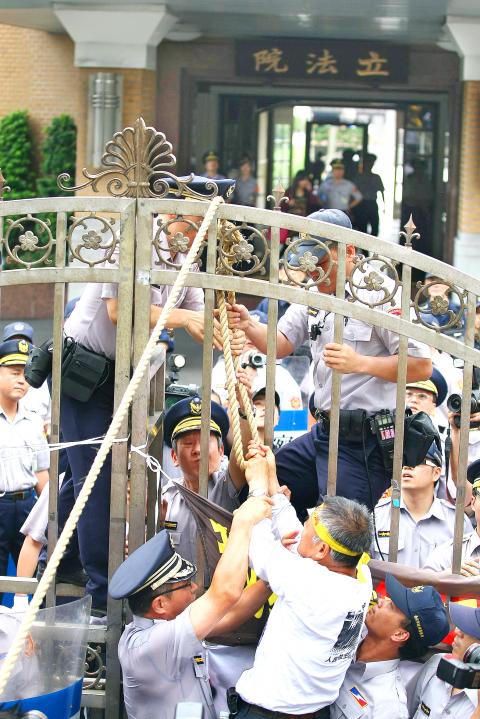Upset about a NT$14 billion (US$485.5 million) budget to continue construction of the Fourth Nuclear Power Plant in Gongliao District (貢寮), New Taipei City (新北市), that was passed by the legislature on Monday, anti--nuclear protesters yesterday rallied in front of the Legislative Yuan in Taipei to demand a referendum on the matter.
The rally organizer, the Taiwan Environmental Protection Union (TEPU), said the Fourth Nuclear Power Plant was a patchwork design assembled by Taiwan Power Co (Taipower), and could threaten the health of people living in Taiwan.
TEPU attempted to submit a petition to the legislature yesterday, asking for the decision to allow operation of the Fourth Nuclear Power Plant to be decided by public referendum, “but they won’t let us inside,” TEPU secretary-general Lee Cho-han (李卓翰) said.

Photo: CNA
“Protesting against nuclear power isn’t just about saving people in Taiwan, it’s also about saving the Earth,” Green Party Taiwan spokesperson Pan Han-shen (潘翰聲) said, adding that “people asked me why we don’t protest against the many nuclear power plants along China’s coastlines ... but we are not the same nation, so we can only control what’s happening in Taiwan and monitor our legislators.”
After protesters were blocked from submitting the petition or entering the Legislature Yuan by shield-wielding police, who lined up behind the closed gates, the protest organizer, a former TEPU chairman and professor at National Taiwan University, Kao Cheng-yan (高成炎), tried to climb the front gate of the legislature, causing a brief scuffle between protesters and police.
Kao said that the public paid for construction of the Legislative Yuan and lawmakers’ salaries, so they should be allowed to enter the legislature to submit their petitions instead of being shut out.

Civil society groups yesterday protested outside the Legislative Yuan, decrying Chinese Nationalist Party (KMT) efforts to pass three major bills that they said would seriously harm Taiwan’s democracy, and called to oust KMT caucus whip Fu Kun-chi (傅?萁). It was the second night of the three-day “Bluebird wintertime action” protests in Taipei, with organizers announcing that 8,000 people attended. Organized by Taiwan Citizen Front, the Economic Democracy Union (EDU) and a coalition of civil groups, about 6,000 people began a demonstration in front of KMT party headquarters in Taipei on Wednesday, organizers said. For the third day, the organizers asked people to assemble

POOR IMPLEMENTATION: Teachers welcomed the suspension, saying that the scheme disrupted school schedules, quality of learning and the milk market A policy to offer free milk to all school-age children nationwide is to be suspended next year due to multiple problems arising from implementation of the policy, the Executive Yuan announced yesterday. The policy was designed to increase the calcium intake of school-age children in Taiwan by drinking milk, as more than 80 percent drink less than 240ml per day. The recommended amount is 480ml. It was also implemented to help Taiwanese dairy farmers counter competition from fresh milk produced in New Zealand, which is to be imported to Taiwan tariff-free next year when the Agreement Between New Zealand and

A woman who allegedly spiked the food and drinks of an Australian man with rat poison, leaving him in intensive care, has been charged with attempted murder, the Taipei District Prosecutors’ Office said yesterday. The woman, identified by her surname Yang (楊), is accused of repeatedly poisoning Alex Shorey over the course of several months last year to prevent the Australian man from leaving Taiwan, prosecutors said in a statement. Shorey was evacuated back to Australia on May 3 last year after being admitted to intensive care in Taiwan. According to prosecutors, Yang put bromadiolone, a rodenticide that prevents blood from

A Japanese space rocket carrying a Taiwanese satellite blasted off yesterday, but was later seen spiraling downward in the distance as the company said the launch attempt had failed. It was the second attempt by the Japanese start-up Space One to become the country’s first private firm to put a satellite into orbit, after its first try in March ended in a mid-air explosion. This time, its solid-fuel Kairos rocket had been carrying five satellites, including one from the Taiwan Space Agency and others designed by Japanese students and corporate ventures. Spectators gathered near the company’s coastal Spaceport Kii launch pad in Japan’s